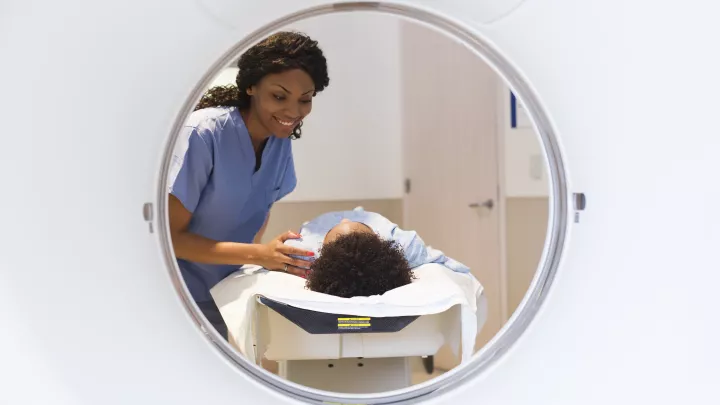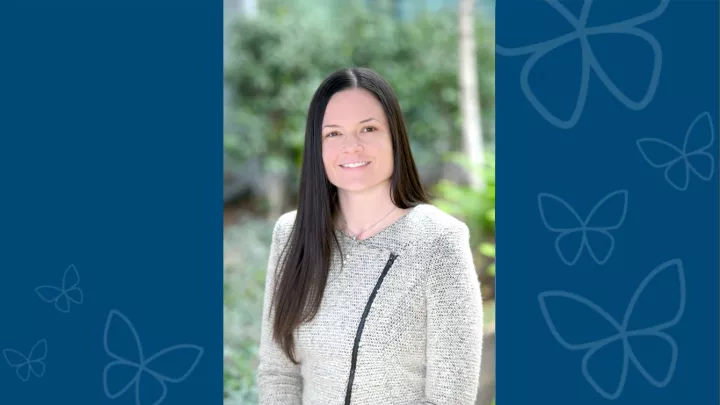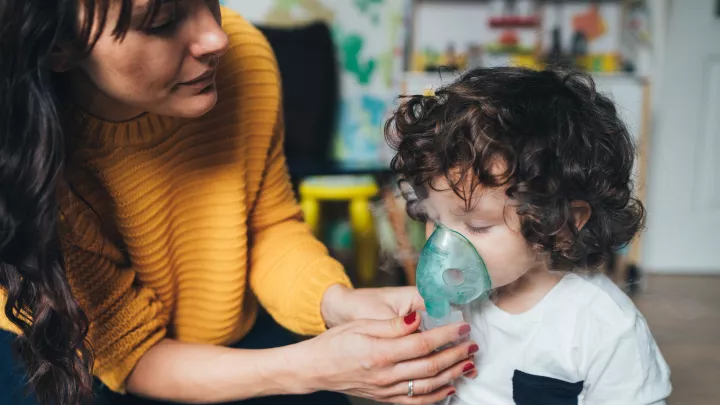Sleep Center
The Sleep Center at Children’s Hospital Los Angeles is one of the region’s largest, most experienced centers diagnosing sleep disorders in children. Our center’s accreditation from the American Academy of Sleep Medicine (AASM) reflects our decades of experience performing thousands of sleep studies each year. We’re dedicated to helping your child get the restorative sleep they need to grow and thrive. With our care, you’ll sleep better, too.
Pediatric Sleep Disorders Care: Why Choose Us?
Pediatric sleep medicine is a specialized offering at CHLA. U.S. News & World Report ranks our pediatric pulmonology and sleep medicine services among the country’s best. We offer expert care for all types of sleep disorders, including sleep apnea, restless legs syndrome and more.
Our pediatric Sleep Center offers:
- Deep expertise: Our pediatric Sleep Center and Sleep Laboratory were among the first in the country to focus exclusively on sleep disorders in children. We’ve been caring for children with pediatric sleep disorders for more than 50 years.
- Highly skilled pediatric sleep specialists: Your child will receive care from Board-certified pediatric sleep medicine specialists. These providers are dual-certified, with additional expertise in specialties such as pulmonology, neurology and general pediatrics. These Board certifications reflect additional training and deep experience. Meet our team.
- Comprehensive sleep studies: Our pediatric Sleep Laboratory has seven private rooms for overnight sleep studies. We also offer daytime nap studies for infants and inpatient sleep studies for hospitalized children.
- Expert diagnostics: We diagnose pediatric sleep disorders in children of all ages, from newborns to young adults. Our team is especially skilled at diagnosing sleep issues in children who have developmental or medical concerns, such as autism or Down syndrome. We also complete sleep studies for children who require ventilator support.
- Dedicated PAP clinic: Children with sleep apnea who need positive airway pressure (PAP) treatment, such as CPAP or BiPAP, receive care at our PAP Clinic. Families meet with a sleep medicine doctor, respiratory care practitioner and clinical psychologist to ensure treatment success.
- Research-focused care: Our team is involved in research and clinical trials to improve the diagnosis and management of sleep disorders in children. We’re especially active in research that advances the care of children with sleep disorders and autism, obesity and Down syndrome.
Types of Pediatric Sleep Disorders
We diagnose and treat common and rare sleep disorders in infants and children, including:
- Sleep apnea and other sleep-related breathing disorders
- Circadian rhythm disorders
- Excessive daytime drowsiness (including narcolepsy and idiopathic hypersomnia)
- Insomnia
- Restless legs syndrome and periodic limb movement disorder
- Parasomnias, including sleepwalking
- Restless sleep disorder
Diagnosing Sleep Disorders in Children
Your child’s care begins with a sleep disorder evaluation. Our sleep specialists perform a physical examination and review your child’s medical history and symptoms. Based on these findings, our team may recommend a sleep study at our Sleep Laboratory.
We perform all types of pediatric sleep studies:
- Overnight sleep study
- Daytime nap study
- Multiple sleep latency test
- Inpatient sleep study
What Is a Pediatric Sleep Study?
A sleep study (also called a polysomnogram) monitors and records different signals from the body as your child sleeps. This includes heart rate, breathing patterns, and stage of sleep. These studies take place in our sleep laboratory, one of the few in the country developed specifically for children.
Each of our Sleep Laboratory rooms features a bed and pillow for your child. They can also bring whatever helps them sleep at home, such as a stuffed animal or blanket. A parent or guardian can stay with their child and sleep in a reclining chair. Video and audio equipment enable our team to monitor activity and sounds in the room during the test.
During a sleep study, a registered sleep technician places sensors (small stickers) at various places on your child’s body, such as their head, chest and legs. A wire connects the sensors to a computer, that monitors and records metrics related to your child's sleep including:
- Brain activity and sleep stage
- Breathing pattern
- Eye movements
- Heart rate
- Muscle movements
- Pulse and blood oxygen level
How Do I Schedule an Appointment for a Sleep Study?
We require a physician to refer you for a sleep study. Your referring physician’s office must send us a complete packet before we can schedule an appointment.
- Physician order sheet (must be filled out and signed by referring physician)
- Current history and physical (within 6 months of order date)
- Demographics
- Copy of insurance card
- Valid authorization from active medical group or health plan
Preparing for a Sleep Study
Comprehensive Sleep Disorder Treatments
Our team uses the sleep study findings to customize a treatment plan for your child. At CHLA, we can refer to all the specialists your child needs to treat a sleep disorder and improve slumber.
Surgery
Children with severe obstructive sleep apnea may need surgery to remove enlarged tonsils (a tonsillectomy). Enlarged tonsils can block your child’s airways when they sleep, leading to snoring and pauses in nighttime breathing. Your child receives expert care from our ear, nose and throat (ENT) doctors. Learn more about otolaryngology (head and neck surgery).
Positive airway pressure (PAP)
Positive airway pressure (PAP) improves the breathing and slumber of children who have sleep-related breathing disorders. Your child may need this treatment if they have any type of sleep apnea, such as obstructive sleep apnea or central sleep apnea.
Your child wears a mask over their mouth and nose while they sleep. Flexible tubing connects the mask to a PAP machine. The machine delivers a gentle stream of air into your child’s airways and lungs. The increased pressure keeps your child’s airways from closing so they don’t have momentary pauses in breathing during sleep.
Your child receives specialized care at our dedicated pediatric PAP clinic. Your family has access to a sleep medicine doctor, respiratory care practitioner and clinical psychologist. It can take time to adjust to sleeping with a PAP machine. Our team helps address any issues to ensure treatment success.
Depending on the diagnosis, your child may need:
- Continuous positive airway pressure (CPAP): The machine delivers a continuous stream of air that doesn’t change. CPAP machines are the most common sleep apnea treatment.
- Bilevel positive airway pressure (BiPAP): The machine delivers a higher air pressure when your child inhales and a lower air pressure when they exhale.
Multidisciplinary Sleep Disorders Care Team
Children with sleep disorders receive complete care from a team of experts. In addition to pediatric sleep medicine doctors and registered sleep technicians, your child’s care team may include:
- Ear, nose and throat surgeons
- Neurologists
- Nurse practitioners
- Pharmacists
- Psychologists
- Respiratory care practitioners
- Social workers
Pulmonology and Sleep Medicine Care at Children's Hospital Los Angeles
Our expert team of pulmonology and sleep medicine specialists diagnoses and manages all types of breathing, lung and sleep issues in children. Learn more about our leading-edge Pulmonology and Sleep Medicine services.
Contact us
Pulmonology and sleep medicine experts at CHLA welcome new patients, referrals and second opinions. Please contact us:
- Phone: 323-361-2287
- Online: Make an appointment
- Second opinions: onlinesecondopinion@chla.usc.edu or visit Online Second Opinions


